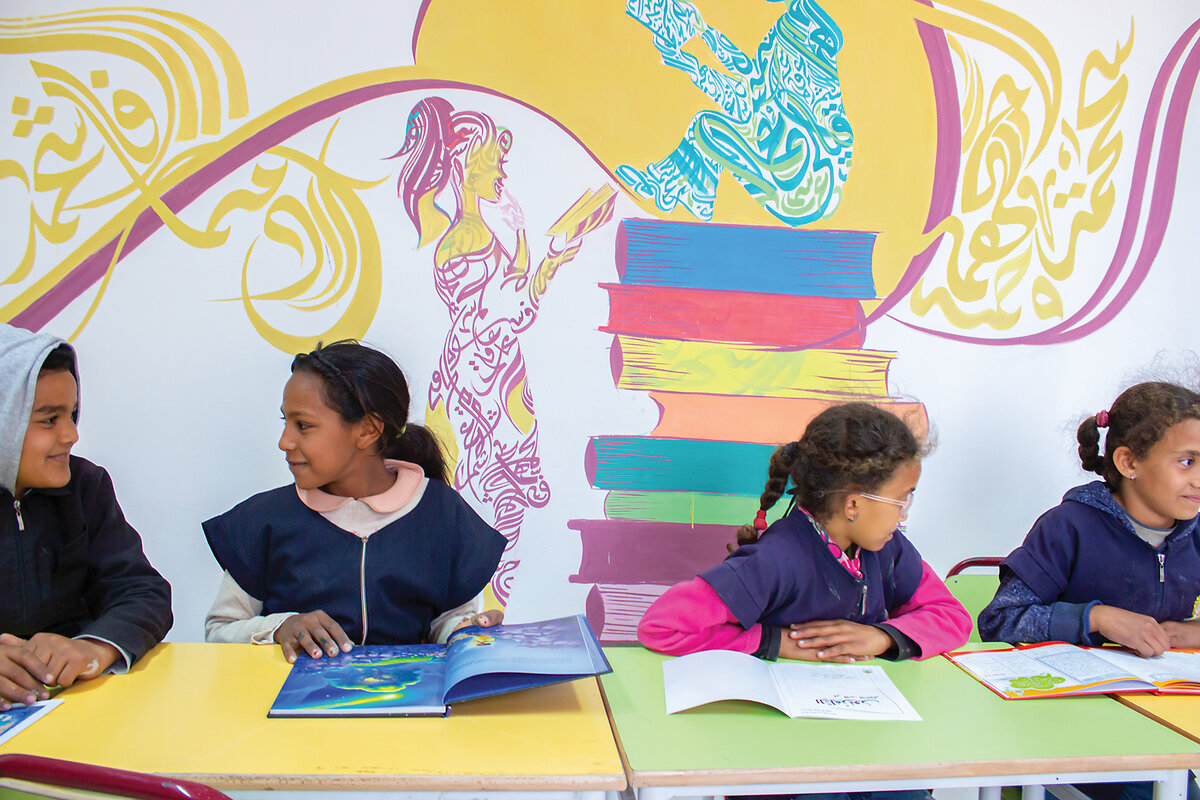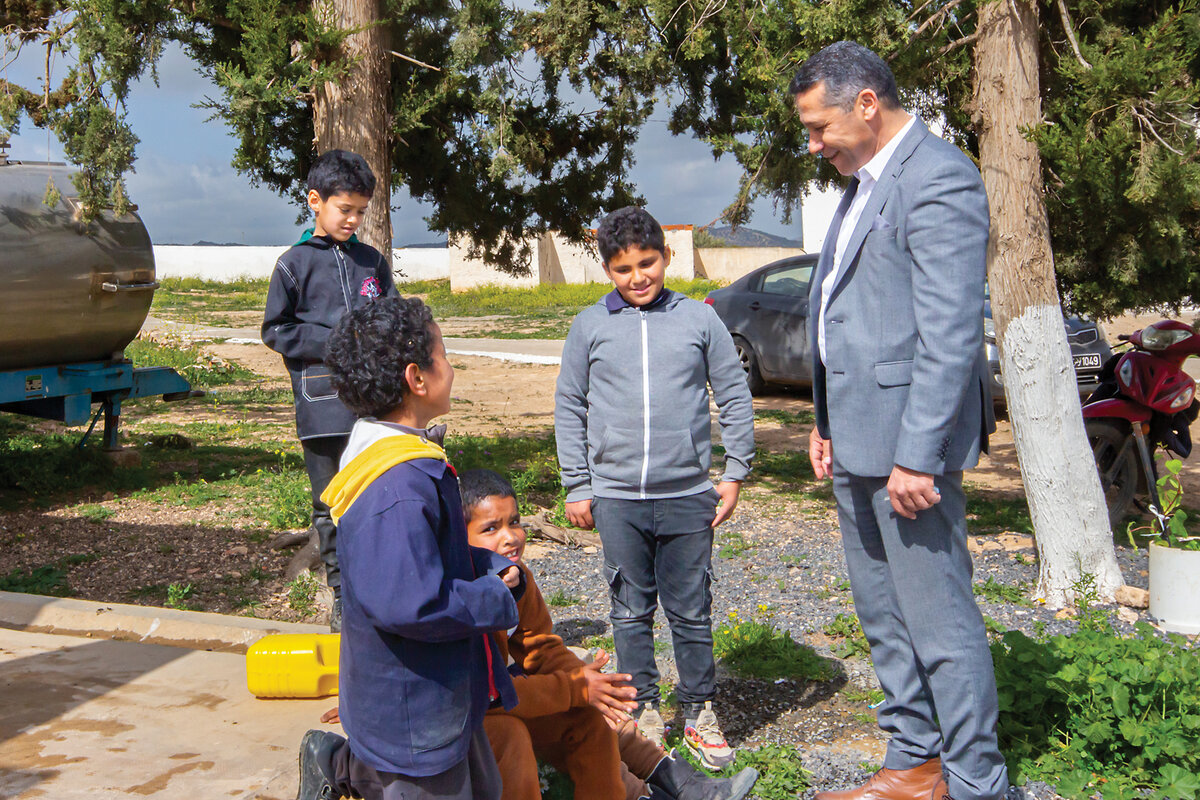This judge grew up with nothing. Now he makes sure that children have books.
Loading...
| Bir El Euch, Tunisia
To children in this hilltop village, their school library is a portal to another world.
Israa Al Trabelsi and five other 9-year-olds barely stifle their giggles as they weave – wide-eyed with curiosity – through the colorful room. They can plop down into cushioned chairs, look at bright wall art, and, of course, browse shelves bursting with books.
The transformative space was built for children to dream in.
Why We Wrote This
Rural Tunisian communities often lack educational resources. White-collar professionals have launched grassroots libraries to bridge the gap.
“I’ve learned so much,” Israa says after taking a seat with a book about faraway lands in her hands. “It is also helping me improve my vocabulary and my writing,” she notes, quickly adding, “I want to be a judge.”
That might seem an unusual ambition for a child in Bir El Euch, a rural community of 1,600 people southwest of Tunisia’s capital, Tunis. But it makes sense when one learns that the man behind the library, Omar Weslati, is himself a judge who knows how precious books can be to children. “This project began as a way to reconcile with the child I once was, who had nothing,” he says.
A response to extremism and exclusion
Economic inequality has long been a challenge in Tunisia, a country of 12 million people. Widespread poverty in rural areas, high unemployment, and poor infrastructure were key triggers behind the 2011 mass protests that toppled a 23-year dictatorship and touched off the Arab Spring uprisings.
Despite national reform plans pledging better distribution of resources, wide disparities between rural and urban regions remain. For instance, the unemployment rate in some communities in the northwest, where Bir El Euch is located, approaches 26%, compared with a national average of 15%. As Tunisia’s economy continues to reel from the COVID-19 pandemic and the high cost of grain imports due to the war in Ukraine, development projects have stalled.
Judge Weslati’s Zira’at al-Maktabat (whose name means “planting libraries” in Arabic) initiative is among several grassroots efforts in recent years aimed at bridging Tunisia’s educational gap.
“I grew up in a rural school without a library, without light, without transportation, and without heating,” Judge Weslati recalls. “As a bookworm, I needed to walk long distances to reach the nearest public library.”
Launched in 2016, the initiative is led by white-collar professionals, most of whom hail from rural communities. These journalists, writers, judges, and teachers have chipped in funding to create a new library every year. Each one serves hundreds of students and takes thousands of dollars to complete.
The project’s launch could not have been timed better. The first “imagination libraries,” as they were initially called, were built in the aftermath of the violent extremism that accompanied the Arab Spring. Amid the waves of unrest that ensued across the region, Tunisia has been the biggest contributor of foreign fighters in the world – with Tunisians joining extremist groups in Syria, Libya, Iraq, and elsewhere.
This was a factor behind the library initiative. “Where the book doesn’t reach, the extremist arrives first,” Judge Weslati says.
Finding a welcoming home for books – within a school or community with supportive principals, committed teachers, and engaged parents – isn’t always easy. A similar initiative, named after social activist Lina Ben Mhenni, had one of its libraries burned down. The initiative’s organizers attributed the attack to a “culture of violence and extremism.”
Besides offering books as a source of inspiration, Judge Weslati’s team began visiting remote schools and sharing members’ personal stories. “We wanted to show kids that people from their own soil once dreamed, created, and contributed,” he says.
“We never saw this as charity; it’s about cultivation,” he adds. “Planting stories where they hadn’t taken root before.”
Beyond reading, the initiative led to something more: a writing club for rural youths. Teenagers craft short stories together and publish their work. One of the teens, Molka Hammami, credits her former teacher Jamila Sherif for lighting a spark in her.
“Reading changed my life,” Molka says. “It pushed me to do more. I was published in the [club’s] collective storybook last year.” Now she helps run a radio show for the club.
Ms. Sherif, who has since become a school inspector, emphasizes the stakes. “Many kids drop out after primary school,” she says. “They don’t have the basic tools they need. We’re trying to change that – one library, one book at a time.”
Reports have shown that, despite declining school dropout rates across Tunisia, the problem is most acute in rural areas. Donia Smaali Bouhlila, an expert on educational inequality at the University of Tunis El Manar, says inadequate schools and infrastructure in rural areas are among the biggest reasons that students drop out.
“When learning spaces lack comfort, resources, or consistency, they stop being places of growth and become sources of alienation,” she says. “Every small success – helping a child learn to read, keeping a teenager engaged – represents a meaningful step forward.”
Books without walls
Safahat, a cultural organization whose name translates to “pages” in Arabic, aimed to serve schools when it was founded in 2020. It established three school libraries in rural areas, but then faced logistical and financial hurdles because of the region’s remoteness. This prompted its team to pivot to a more mobile model: public bookcases.
Through its Maktabtena (“our library”) initiative, the group placed red-and-white boxes of books in hospitals, youth centers, and schools, and on street corners. “This is our way of reviving a culture of reading,” says Khawla Mondhri, a university professor and volunteer leading the initiative.
Readers are invited to take a book, read freely, and donate their own books if they can. “We want to make reading a habit, not a luxury,” Professor Mondhri says. “If someone takes a book and doesn’t return it, that just means it’s being read somewhere else. And that’s enough for us.”
So far, the team has installed 35 bookcases in accessible, safe, and visible spots. To ensure a bookcase is never empty, the team has formed partnerships with municipalities, associations, and individuals.
“We send books as often as needed. We plant small oaks,” Ms. Mondhri says. “But we dream of forests.”
This article was published in collaboration with Egab.









